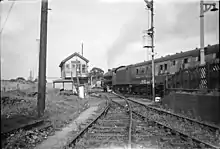Blackwell railway station
Blackwell railway station was a railway station serving Blackwell in the English county of Worcestershire.
Blackwell | |
|---|---|
| General information | |
| Location | Blackwell England |
| Platforms | 2 |
| Other information | |
| Status | Disused |
| History | |
| Original company | Birmingham and Gloucester Railway |
| Pre-grouping | Midland Railway |
| Post-grouping | London, Midland and Scottish Railway |
| Key dates | |
| 5 Jun 1841 | Opened |
| 18 Apr 1966 | Closed[1] |
.jpg.webp)

History
It was opened by the Birmingham and Gloucester Railway in 1841 a year after the line opened. In 1846, it became part of the Midland Railway which had been formed two years before.[2]
It was situated at the top and northern end of the steepest part of the Lickey Incline and, slightly to the north were the sidings where the banking engines would drop back from their trains and reverse ready to return to Bromsgrove. In addition, trains travelling southwards (downhill) would be brought to a stand at the head of the incline for a brake test including, until 1941, passenger trains. In the days before through braking of goods trains, wagon brakes would have to be pinned down. Even later, when vacuum braking had been introduced, most trains would only be partly fitted and, often, a banking engine would have to lead the train to provide extra braking.
There were two platforms, that on the down (southward)[3] line being exceedingly long - much longer than that on the upside. Access to it was by a barrow crossing to the south, there being no footbridge. There were short goods sidings for each line running into bay platforms, with an extra one on the upside. The entrance and booking hall was on the up platform, with a small waiting room on the other side. Construction was of typical Midland Railway brick built design with wooden awnings.
At grouping in 1923 it became part of the London Midland and Scottish Railway. The station closed in 1966. Although a few railway cottages still exist, the station itself has disappeared.
Stationmasters
- William Buckingham ca. 1845 - 1877[4]
- Thomas Clay 1877[4] - 1881[5] (afterwards station master at Croxall)
- G. Freeman 1881 - 1884[5] (afterwards station master at Fish Ponds)
- Richard Foskett 1884 - 1889[5] (formerly station master at Monsal Dale, afterwards station master at Borrowash)
- John V. Hawkins 1889[5] - 1898[6] (formerly station master at Sawley, afterwards station master at Sharnbrook)
- Charles Roughton 1898 - 1901[6] (formerly station master at Church Road, Birmingham)
- J.A.E Rainbow 1901 - 1905[6] (formerly station master at Shustoke)
- John Benjamin Tuffley 1905[6] - 1911[7] (afterwards station master at Alcester)
- Charles Henry Shill 1911 - ca. 1924 (formerly station master at Cam and Dursley)
- H.L. George from 1939[8]
- Charles Harper 1947 - 1965[9]
| Preceding station | Disused railways | Following station | ||
|---|---|---|---|---|
| Bromsgrove | Birmingham and Gloucester Railway |
Barnt Green |
References
- Butt, R.V.J., (1995) The Directory of Railway Stations, Yeovil: Patrick Stephens
- Preston Hendry, R., Powell Hendry, R., (1982) An historical survey of selected LMS stations : layouts and illustrations. Vol. 1 Oxford Publishing
- Direction on this line was, and is, measured from milepost zero at Derby
- "1871-1879 Coaching". Midland Railway Operating, Traffic and Coaching Depts: 320. 1871. Retrieved 11 January 2022.
- "1881-1898 Coaching". Midland Railway Operating, Traffic and Coaching Depts: 337. 1881. Retrieved 11 January 2022.
- "1899-1908 Coaching; Piece 1027". Midland Railway Operating, Traffic and Coaching Depts: 53. 1899. Retrieved 11 January 2022.
- "Promotion of the Stationmaster". Bromsgrove & Droitwich Messenger. England. 3 June 1911. Retrieved 11 January 2022 – via British Newspaper Archive.
- "Mr. H.L. George". Birmingham Daily Post. England. 20 April 1939. Retrieved 11 January 2022 – via British Newspaper Archive.
- "'Pay as you go' from Blackwell and Stoke". Birmingham Daily Post. England. 11 December 1965. Retrieved 11 January 2022 – via British Newspaper Archive.